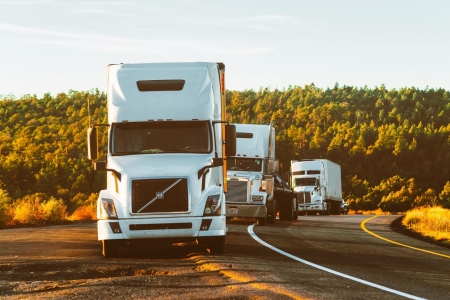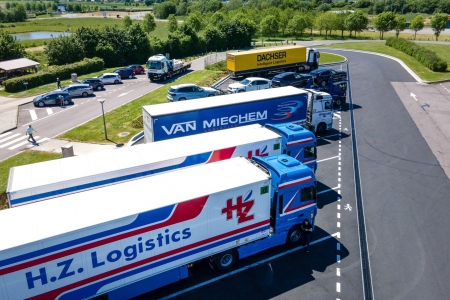Automobile transportation: advantages, disadvantages, and features
Transportation of equipment, components, raw materials, goods, and other essential products from one place to another ensures not only the functioning but also the existence of humanity. Cargo can be transported by air, water, rail, or road, each with its own advantages and disadvantages, so it is worth highlighting their unique features separately.
Choosing the right vehicle or the correct combination of transport methods is the key to successfully delivering cargo in the shortest possible time and at an acceptable cost.
Which transport is best and what options are available
The main pros and cons of transport for goods delivery.
The air delivery method is the fastest among all existing options, but it has several disadvantages:
- High transportation cost.
- Significant weight restrictions for cargo.
- An airfield is required.
- Goods cannot be delivered directly to the customer's address without using other types of transport.
- Requires special loading and unloading terminals.
Air transport is well-suited for transporting small, high-value, and particularly valuable cargo over long distances in the shortest possible time. An airplane can also be used to transport parts and components for aerospace equipment.
Water transport is divided into sea and river, which allows for the package to be delivered as close to the customer as possible.
Sea freight is ideal for long-distance delivery, including to another continent. Advantages include:
- Delivery rates are considered among the lowest.
- No restrictions on weight, dimensions, type, or purpose.
Disadvantages may include:
- Long delivery times.
- A well-equipped cargo terminal or port is required.
- Transported goods cannot be delivered directly to the customer without using another type of transport (except in rare cases).
Railway transport enables goods to be moved over long distances on land, with the following advantages:
- Low service costs.
- Delivery takes less time compared to sea transport (no need to circumnavigate a continent).
- No restrictions on the type and purpose of transported goods.
Unfortunately, there are also disadvantages:
- Delivery time depends on the characteristics and location of the railway.
- Special cargo terminals are required.
- Strict dependency on track gauge.
If the customer does not have access to the railway, another mode of transport is required to receive the goods.
Transporting cargo by trucks is considered the most versatile option, although road transport has its own share of pros and cons. For a quick comparison, here are some key differences:
- Delivery time is shorter than with water and rail transport.
- The dimensions and weight of most transported goods are comparable to those for railway transport.
- The main advantage of road transport is its mobility and ability to deliver cargo to locations where other types of transport cannot be used, as well as in areas with no roads at all.
Negative aspects include:
- Transportation costs, which are second only to air transport and higher than sea or rail transport.
- Poor organization of road transport can negate all the advantages of road transport over other modes. Therefore, we recommend entrusting this task exclusively to experienced and reliable organizations like the specialized company "Mak-Trans." By signing a contract with us, you will receive a full package of services, and cargo delivery will become a routine task that requires minimal financial effort from the customer.
Road transport can be avoided if a railway line leads directly to your enterprise, especially if it connects from a cargo port or airfield. This is possible when the organization is located within an industrial center and has a large volume of supplies. In all other cases, this is impractical, and trucks will be the only delivery option.
What can be transported by trucks
There are few restrictions in this regard, so almost anything can be transported, except for certain solid structures that cannot be disassembled or would incur high costs if dismantled.
By classification, cargo transported by road can include:
- Bulk or loose goods. This includes rocks of various fractions, scrap metal, food products (grain, sugar, etc.), and products obtained through chemical or other means (fertilizers, salt, etc.). Fine-structured goods such as flour, cement, lime, etc., require special packaging for transport.
- Liquid goods. These include all products in liquid form that can be placed in any type of container (barrel, tank, etc.), such as oil, milk, water, various oils, paint, or complex chemical components for further processing.
- Gaseous goods. This category includes substances naturally in a gaseous state, primarily oxygen, nitrogen, propane, butane, etc., as well as artificially produced gases (phosgene, chlorophos, etc.). They can be transported either in gas cylinders or in liquid form in special containers.
- Piece goods. These are items transported individually and may also be referred to as general cargo.
- Oversized goods. These are items that exceed standard size, weight, or maximum height restrictions in the usual position.
- Perishable goods. Food and chemical products that require a specific microclimate during transport, as they are prone to spoilage under normal conditions.
- Hazardous goods. This category includes all substances that can harm people and the environment during storage or transportation. Transporting such goods requires specialized vehicles, special permits, and a high level of skill in operating the vehicle.
Maintaining your own transport for periodic deliveries is not always practical and can be wasteful. The fleet of vehicles owned by the transport company "Mak-Trans" can handle any transportation needs for its customers.
Advantages and Disadvantages of Road Transport
Freight road transport is widely used in agriculture, construction, military, chemical, oil and gas, metallurgical, mining, and other industries, as well as for delivering purchases to both businesses and private individuals.
A more detailed analysis of road transport, its advantages, disadvantages, and areas of application, yields the following insights.
Positive aspects of road transport:
- Goods can be delivered "door-to-door," a service that other forms of transport can only provide if the customer has their own airfields, ports, or railways connected to the country's rail network.
- Eliminating cargo transshipment during transportation significantly reduces the risk of damage and offers additional savings on packaging.
- Everything needed can be brought to the most remote areas, even where transport infrastructure is completely or partially lacking.
- Routes can be changed or adjusted directly during transit. This usually occurs due to major accidents, landslides, or other unforeseen circumstances that could block the vehicle's planned route.
- A wide range of vehicles is available to transport goods or materials of various weights and sizes. For each type of cargo, an optimal vehicle with the appropriate technical specifications can be selected, including specialized vehicles.
- Delivery speed is significantly faster than sea and rail transport, thanks to the lack of long queues at specialized loading and unloading terminals and the reduced paperwork required for transportation.
Notable disadvantages include:
- Fuel and lubricant costs are relatively high compared to the mass of goods being transported. This downside can be mitigated by selecting vehicles with optimal characteristics and maintenance costs. For transporting 1-2 tons of cargo, it is not practical to use a vehicle with a capacity of 5 or more tons or one with low off-road capability in remote and sparsely populated areas.
- High accident rates and the potential for cargo damage. Large volumes carry their own risks, which can be minimized with the right route planning and driver experience.
- Heavy loads require the use of special trailers and multi-wheel low loaders to reduce road pressure. Some infrastructure (bridges and roads) cannot support the weight of the transported load, which can significantly extend the route.
- Oversized and hazardous cargo can only be transported with special permits. The speed and accuracy of obtaining these depend on the applicant's experience, and inexperience may cause serious issues along the way. To avoid this, involve experienced people—like the staff of "Mak-Trans." Our specialists will handle everything promptly with minimal state fees. We have vehicles for "all situations," and our skilled drivers ensure safe, accident-free delivery to any specified location.
Now you know the main advantages and disadvantages of road transport to fully leverage its strengths. For maximum benefit in your current and future operations, be sure to take advantage of the extensive range of services offered by our organization, "Mak-Trans."

.png)
 Viber
Viber  Telegram
Telegram 

